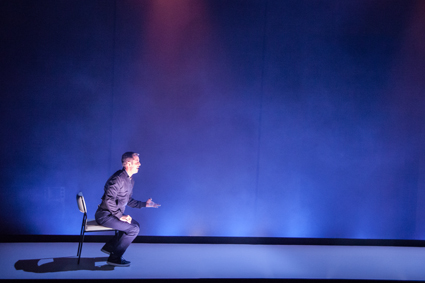In Profile: Angus Cerini, writer, performer, director
John Bailey

Angus Cerini, Resplendence
photo Sebastian Bourges
Angus Cerini, Resplendence
photo Sebastian Bourges
Angus Cerini, Resplendence
Angus Cerini was supposed to have an audition the day before we spoke recently, but turned down the part after realising who he was being asked to play. “I always get asked to audition for thugs and it’s just not me,” he says. “Don’t send me for drug dealer parts. It’s not what I’m good at… I did ballet for 10 years and I’m in my body. Give me shit that’s big because I’m a performer. There’s no point trying for these silly roles because other actors can do that and they’re good at it and we’re going to waste everyone’s time.”
It’s not hard to see why casting agents would make such errors. For the better part of two decades Cerini’s theatrical practice has presented viscerally confronting takes on masculinity, abuse and the relationships between violence and power. To reduce to the status of ‘thug’ any of the characters he has so scarily embodied is itself a bit harsh, but he knows he’s not going to be offered a romantic lead on the strength of his stage output, either.
For those who have followed Cerini throughout his career, it’s tempting to see it as the sort of continuous oeuvre quite rare in Australian theatre, in which the same questions and concerns run through every work, and each of his tortured torturers offers another aspect of a kind of ur-male that can never be fully represented.
“I reckon everything I’ve done has really been a meditation,” he agrees. “I feel like I’ve always been looking at why men do this, why this happens. There’s this really bad person, this young man. It’s been more about philosophy. And also about worship or prayer or somewhere to have power. Much bigger, in my own mind, than just putting on a show.”
Cerini’s monstrous young male was most recently incarnated in the form of the bomber-jacketed entity at the centre of Resplendence, a bundle of nerves at first attempting to punch the universe but eventually battered down by existence itself; earlier, he found a fascinating voice in the two-hander Wretch (2009), and can be traced back to the cryptic figures of Saving Henry (2003), Detest (2007) and Puppy Love (2006).
I’m surprised when Cerini even traces a thread back to a work in which we both performed close to 20 years ago, a university production of Clive Barker’s The History of the Devil. No prizes for guessing who Cerini played. “I was a bit mad at the time but I sort of summoned the fucking devil. Every night before the show I’d shave my head and I’d draw the pentagram on the mirror and fucking ask that fucker to fill me. We all started in the auditorium and at the very first show I was sitting there in a chair in that St Martin’s Theatre and I felt a fucking presence in the back right corner of that theatre, like a big massive bloaty fat flabby thing, and I turned around and there was this energy.”
His performance was certainly memorable, and much more committed than the usual uni theatre outing. “Anyway, after the show had finished I was back at Mum’s house in Vermont and I was out the back telling the devil to fuck off, like that’s enough,” he continues. “And no shit, this massive storm of crows, probably a hundred of them turned up. The backyard was full of crows. Yeah, I was a little bit mad.”
Cerini knows that the story is over-the-top, but the places he wants audiences to go require that bold leap into darkness. I don’t know that he ever did completely rid himself of the devil, since every one of his subsequent works has the quality of an exorcism. “Yeah,” he says. “Let’s go in there together but let’s go as dark as we can, let’s bring the fucking evil out, then once we’ve brought it to life let’s fucking put it to death. Let’s sic the fucking animal on it. Then what happens if the devil kills the animal that you’ve got to protect you? What have you got left? It’s going to the darkest places in order to work out how to defeat them.”
His efforts in recent years have drawn much recognition. Wretch earned him the Patrick White Playwrights Award, Save for Crying won two Green Room Awards and an RE Ross Trust Award, and most recently his script The Bleeding Tree won the Griffin Award. It’s testament to the quality of Angus Cherini’s practice that such a physical, embodied performer can also sculpt language that carries as much energy on the page. “It’s interesting because I reckon Wretch and Save for Crying and probably Resplendence, the later stuff, I don’t think you can approach them as an actor. You have to approach them almost as spoken word or poetry. Rather than working out what you’re trying to say… We need to just say it and let the lines speak. It’s about the bigger journey.”
Selected articles
Intuiting change
John Bailey: Angus Cerini, This Thousand Years I Shall Not Weep
RealTime issue #71 Feb-March 2006 pg. 29
poplectic apocalypto
Tony Reck: Angus Cerini, Chapters from the Pandemic
RealTime issue #81 Oct-Nov 2007 pg. 38
no room for psycho-realism
John Bailey:P Angus Cerini, Wretch
RealTime issue #90 April-May 2009 pg. 40
reworking language for the theatre
John Bailey: Angus Cerini, Save for crying
RealTime issue #102 April-May 2011 pg. 33
an exchange: acting, reality & (dis)ability
Angus Cerini & John Bailey, correspondence
RealTime issue #109 June-July 2012 pg. 26
Braving the limits of the monologue
John Bailey: Angus Cerini, Resplendence
RealTime issue #122 Aug-Sept 2014 pg. 46
RealTime issue #123 Oct-Nov 2014 pg. online






